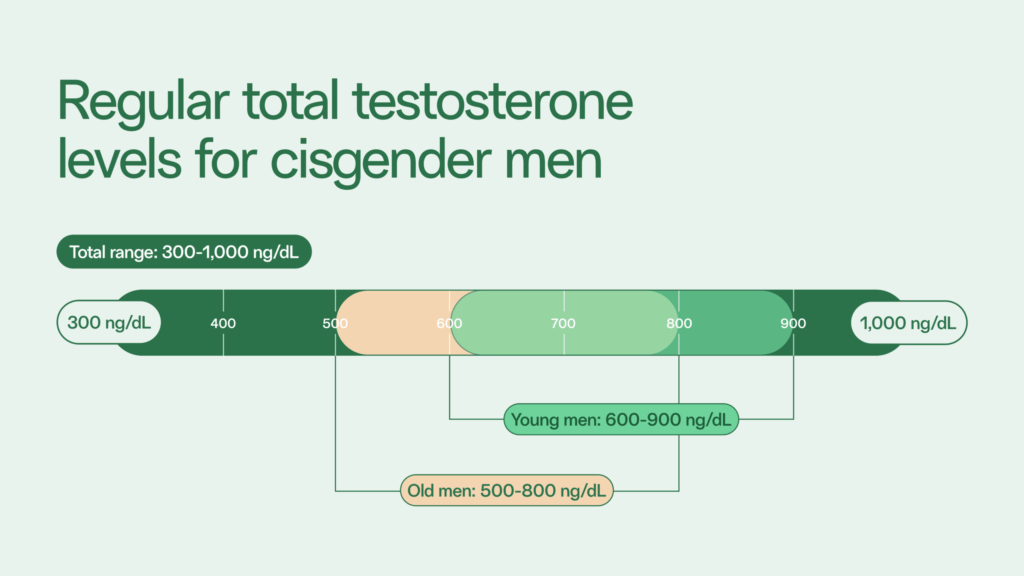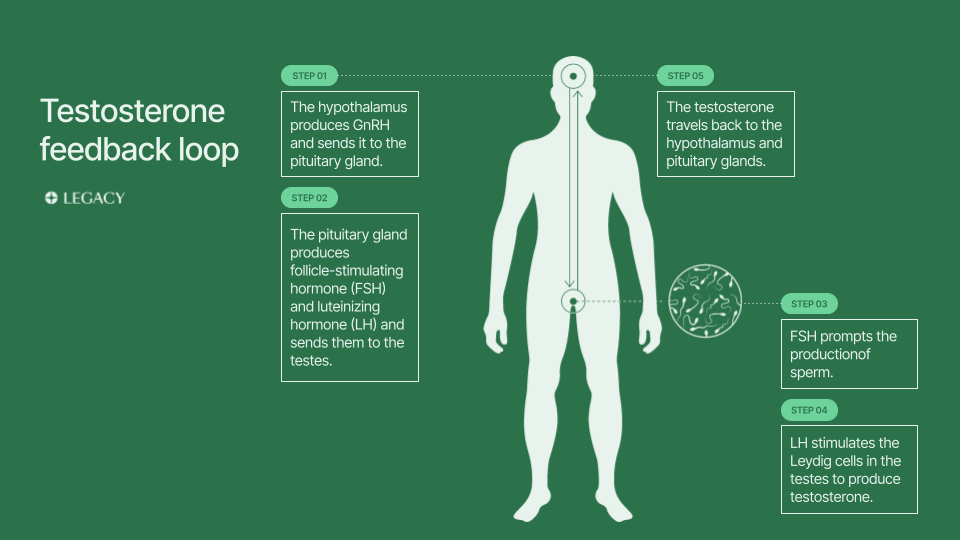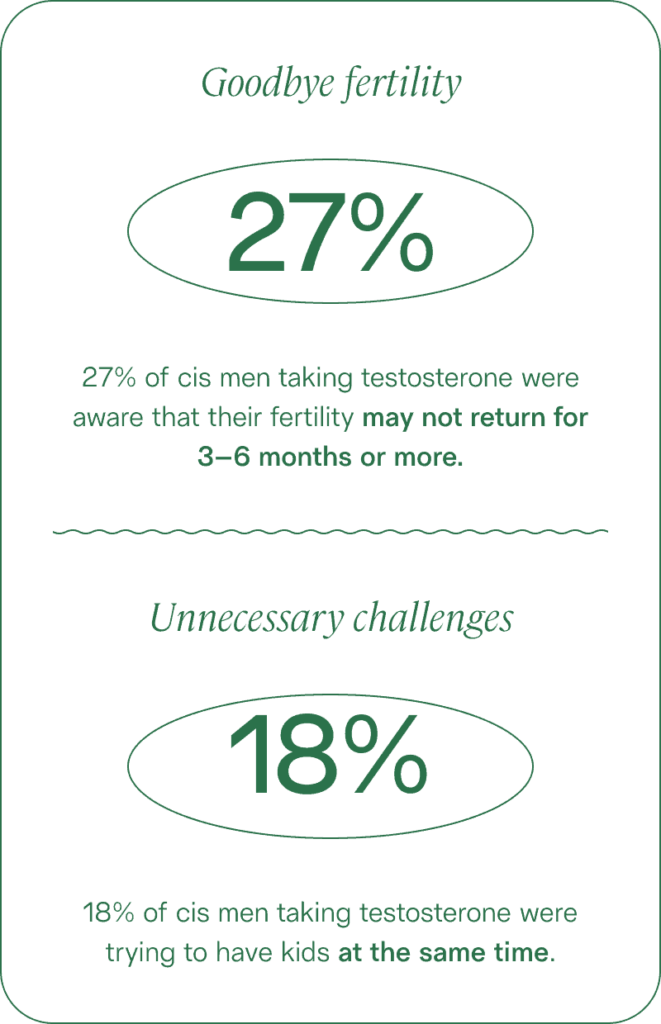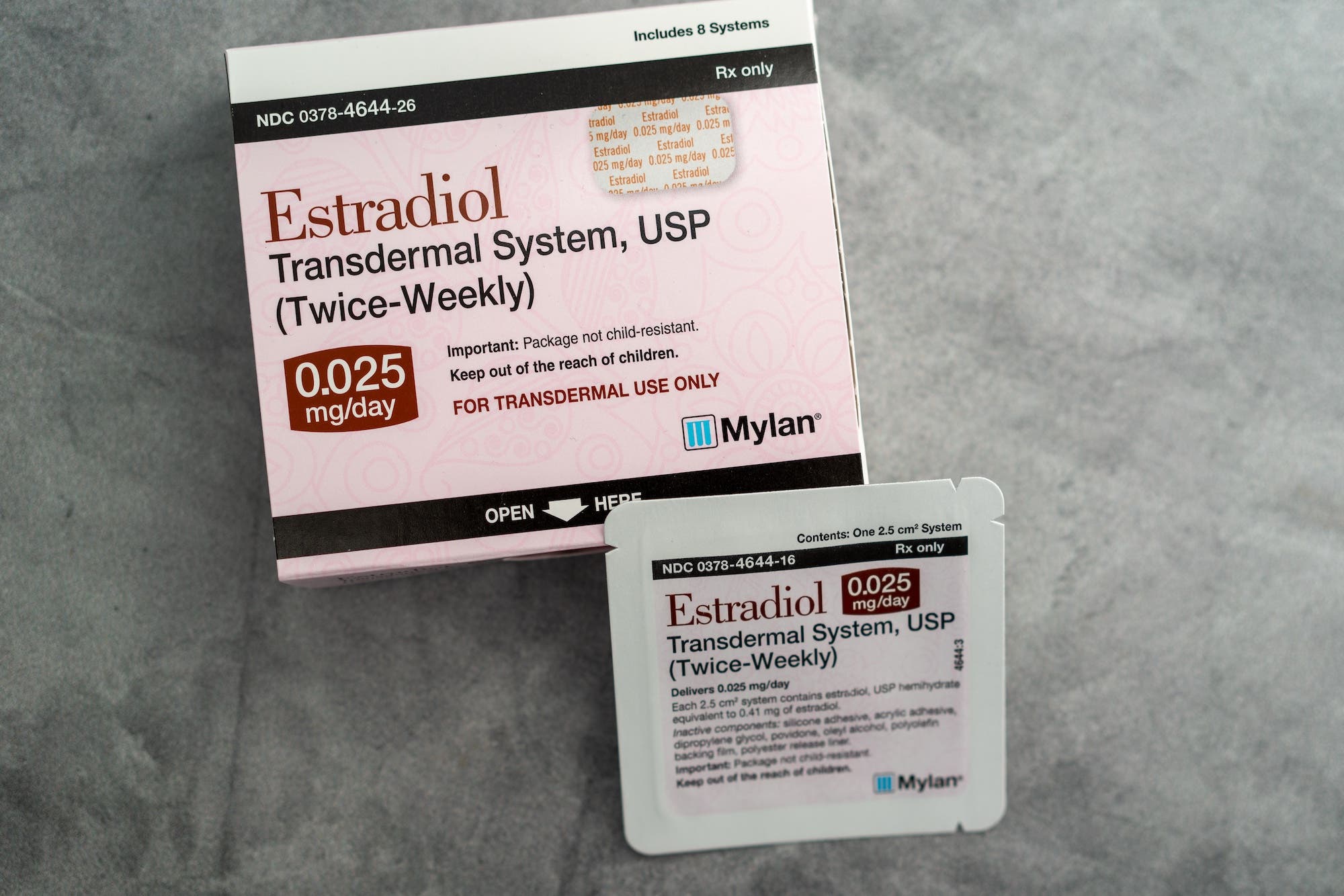There are many myths and misconceptions surrounding testosterone, from how to increase your testosterone, to testosterone’s impact on athletic performance or even male fertility. In this article, we’ll dive into some of the most common testosterone myths and look at the research behind the truth.
Key takeaways
- While taking supplemental testosterone may enhance muscle mass and athletic performance, studies have shown that athletes don’t necessarily have naturally higher testosterone.
- There’s no evidence that a meat-heavy diet — or eating lots of soy — will have a positive or negative effect on testosterone levels.
- Testosterone is important for sperm production, but low levels are sufficient for healthy male fertility. Taking supplemental testosterone can have a detrimental impact on sperm production.
Myth: Athletes have higher testosterone levels, and testosterone improves athletic performance.
Testosterone is linked to higher muscle mass, strength, and endurance, along with lower body fat. This leads to the idea that athletes likely have more testosterone and that higher testosterone improves athletic performance.

Truth: The relationship between testosterone and athletic performance is complex.
It’s true that taking supplemental testosterone may enhance athletic performance.1 That’s why taking testosterone and testosterone-boosting medications like Clomid is typically banned for professional athletes.
However, when it comes to natural testosterone levels, the correlation is less clear. While more research is needed, so far, there’s little evidence that testosterone is higher among athletes. A study from 2018 found that, among 689 Olympic athletes, 25.4% of the men in 12 different sports actually had low testosterone concentrations.2
It’s possible that intense training played a role in lowering the athletes’ testosterone levels. Studies have found that certain types of exercise, like strength training, tend to increase testosterone levels. On the other hand, endurance training — think distance running — and cycling tend to lower testosterone levels.3–7 (That doesn’t mean aerobic exercise is bad for you; it has many benefits for our cardiovascular systems and overall health.)
The researchers in the 2018 study also hypothesized that past use of steroids or the athletes’ varied ages may have played a role in the result. Anabolic steroids lower male fertility and may impact long-term testosterone levels, while testosterone naturally decreases with age.
Does having higher natural testosterone levels give athletes an advantage? It’s unclear. A 2011 study examined testosterone concentrations in the saliva of eight professional male athletes.8 The study found no correlation between testosterone levels and the athletes’ performance. Another study in 2017 found no pattern between performance and testosterone levels among male track and field elite athletes.9
With many variables at play in this area, additional research is needed to understand the role of testosterone in male athletic performance.
Myth: Low testosterone causes infertility.
Testosterone is important for sperm production, so it makes sense to think that low testosterone would lead to infertility. However, that’s not quite how it works.
Truth: Even people with low testosterone can produce healthy sperm.
Even if testing reveals low levels of testosterone in your blood, your body may still have adequate amounts of the hormone for sperm production. That’s because testosterone levels in the testicles are 25 to 125-fold higher than in the blood.10 While low testosterone is typically diagnosed at 300 ng/dL, one study found that there was no significant impact on semen parameters until testosterone levels dropped below 264 ng/dL.11
While testosterone plays a critical role in spermatogenesis (sperm production), it’s only one of several hormones involved in male fertility. Follicle stimulating hormone (FSH) and luteinizing hormone (LH) are also essential for stimulating sperm production as well as controlling testosterone production.
A disruption to this hormonal balance can affect fertility. That’s why increasing your testosterone levels with testosterone replacement therapy can actually cause infertility — more on this below.
It’s true that low testosterone can still affect your fertility in other ways. The condition, known as hypogonadism, can cause erectile dysfunction and low sex drive. If you’re experiencing these issues and trying to conceive a child, erectile dysfunction medications or fertility treatments like in vitro fertilization (IVF) may help.
Learn more about trying to conceive with low testosterone.

Myth: Eating meat can improve testosterone levels, while eating soy can decrease testosterone.
Do a quick online search and you’ll come across tons of articles on the effect of diet on testosterone levels. A common recommendation is to eat more meat — or even try a carnivore diet for boosting testosterone — while cutting back on soy. But is this advice backed by science?
Truth: Evidence around diet and testosterone is very inconclusive.
The truth is that we don’t fully understand how diet affects testosterone levels. While there’s some research, it’s inconsistent and inconclusive.
For example, one study found that the keto diet — which is heavily focused on eating fats and proteins while cutting carbs — may lead to increased testosterone levels, supporting the idea that eating meat might boost testosterone levels.12 But another study showed that testosterone levels decreased by 11% in the group eating a keto diet compared to a western diet (though the authors noted that that result was unexpected).13
Beyond the keto diet, the role of meat itself in boosting testosterone levels remains unclear. One study found that a pro-inflammatory diet — typically including foods like red and processed meat, sugar, and refined carbohydrates — was associated with lower average total testosterone levels and an increased risk of testosterone deficiency.14
One study looked at 189 young men and compared their dietary intake, categorized by processed red meats (like burgers and hot dogs), unprocessed red meats, organ meats, poultry, and fish.15 A similar study looked at dietary patterns among 206 young men in Spain.16
In both studies, those who consumed the most meat did not have higher testosterone levels than those in the lowest quartile of meat consumption.
| Average total testosterone levels | |
| Men with the lowest consumption of meat | 643 ng/dL |
| Men with the highest consumption of meat | 600 ng/dL |
Source: Maldonado-Cárceles et al, 2018.
Normal total testosterone levels are 300–1,000 nanograms per deciliter (ng/dL).
What about soy? Unfortunately, the evidence isn’t clear-cut here either. There are concerns that soy may affect male fertility because it has a high level of a plant compound called phytoestrogens, which may act like estrogen in the body. However, a 2010 meta-analysis that looked at 32 different studies concluded there was no effect of soy foods on men’s testosterone levels.17
Bottom line, more research needs to be done on diet and testosterone levels before we can recommend a specific diet to naturally increase testosterone.

Data from Legacy’s 2023 Sperm Report found that many men — even those currently taking testosterone — were unaware of the impact of TRT on male fertility.
Myth: Taking testosterone can improve fertility.
Testosterone is essential for reproduction, so boosting your testosterone levels should increase your fertility, right? Not quite. With this myth, the opposite is actually the case.
Truth: Testosterone therapy usually halts sperm production altogether.
It’s true that testosterone is necessary for sperm production. However, rather than helping your body produce more sperm, taking extra testosterone will disrupt the balance of hormones in your body and actually stop sperm production, leading to infertility.
Why? It has to do with the hormonal “cascade,” the process by which one hormone triggers the production of another. In the male body, the hormonal cascade works like so:
- The hormone GnRH from the hypothalamus triggers the pituitary gland to release follicle-stimulating hormone (FSH) and luteinizing hormone (LH).
- LH triggers the testes to produce testosterone.
- Testosterone works with FSH to prompt spermatogenesis, the production of sperm.
- Testosterone travels back to the hypothalamus and pituitary glands to regulate the release of other male fertility hormones.
By taking extra testosterone, you are overloading that feedback system. If the body believes it has more than enough testosterone, it will stop producing FSH and LH, levels of those hormones will drop, and sperm production will slow or stop altogether.
Research has found that testosterone halted sperm production and led to azoospermia (no sperm in the semen) in 65% of men after four months of use.18
In these cases, the way to restore sperm production is by stopping the use of testosterone. Sperm production may return to normal 6–12 months after discontinuing testosterone, but there’s no guarantee.If you have low testosterone levels, testosterone replacement therapy (TRT) can help increase your libido and resolve symptoms, but it will still negatively impact your fertility. If you’re in this situation, you can freeze your sperm before TRT to preserve your fertility.
References
1. Wood et al, “Testosterone and sport: Current perspectives.” 2012.
2. Sönksen et al, “Why do endocrine profiles in elite athletes differ between sports?” 2018.
4. Kraemer et al, “Acute hormonal responses in elite junior weightlifters.” 1992.
10. Smith et al, “The Regulation of Spermatogenesis by Androgens.” 2015.
16. Mendiola et al, “Food intake and its relationship with semen quality: a case-control study.” 2008.
17. Hamilton-Reeves et al, “Clinical studies show no effects of soy protein or isoflavones on reproductive hormones in men: results of a meta-analysis.” 2010.18. Patel et al, “Testosterone Is a Contraceptive and Should Not Be Used in Men Who Desire Fertility.” 2018.



